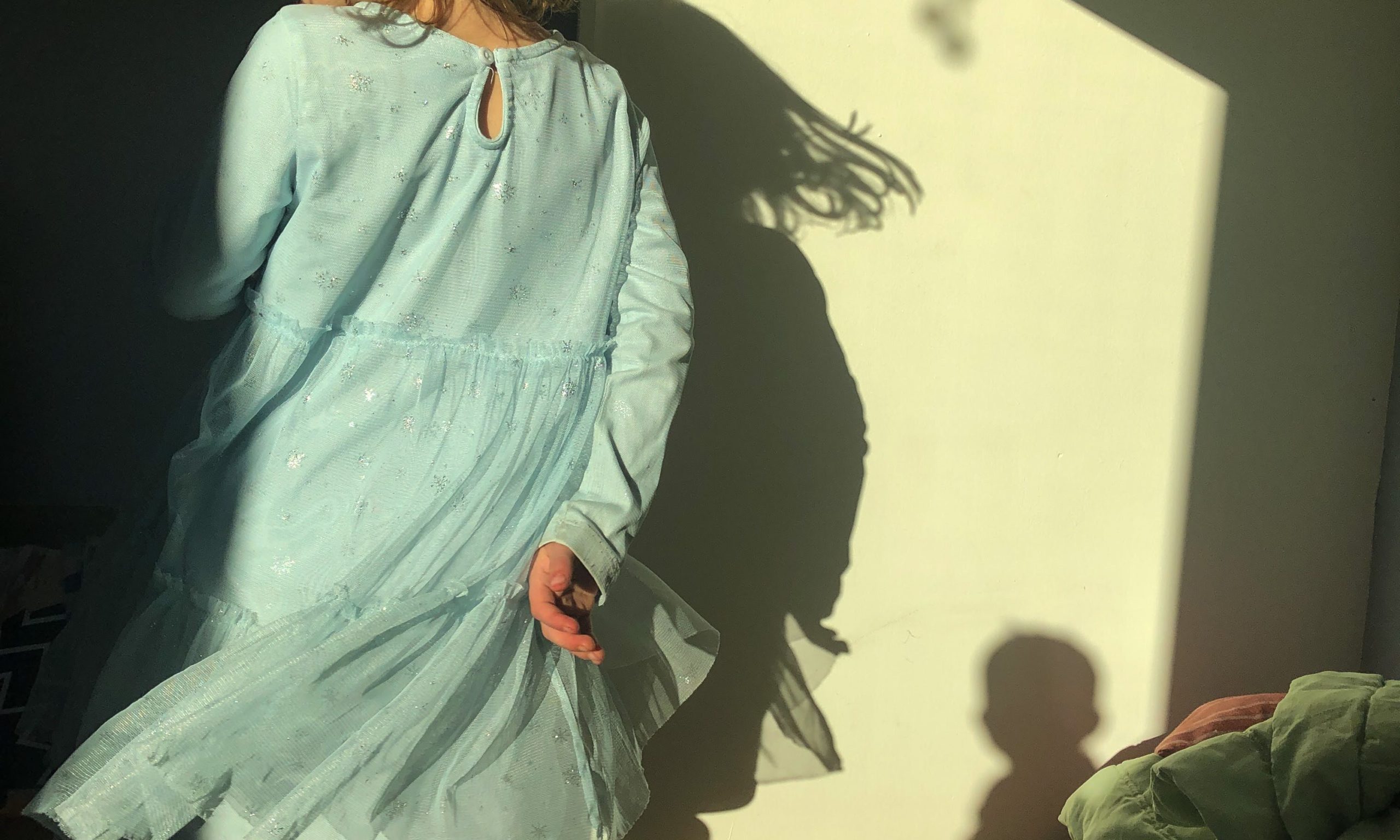
It’s been nearly eleven months since I set foot in a physical classroom. I’ve organized virtual residencies, taught countless zoom classes, recorded workshops, and brainstormed over and over again how best to reach our students during this time. My off-screen experience these eleven months has been focused on another form of education–parenting my own two children.
In 2016, I read my fair share of parenting books before my first daughter’s birth. There was The Happiest Baby on the Block, teaching me how to swaddle and replicate the baby’s experience inside the womb. There was Bringing up Bebe, whispering of the magical French babies who sleep through the night at eight weeks and their perfect mothers who don’t dare wear a ponytail or sweatpants (I can’t help but wonder how they’ve fared working from home). There was not a book on parenting during a pandemic. And so, with my second daughter arriving in July of 2020, we were left to our own devices to navigate an unexpected and enormous twist in the plan. Like parents around the world, we watched and wondered what magic trick might help our kids manage the enormity of the moment.
As we’ve navigated and I’ve watched my four year old and my students grapple with challenge after challenge, I see them drawing again and again on their creative tool kits. I’m sorry to say I don’t have a pandemic parenting guidebook to offer, but I would like to point out just a few of the creative skills that I’ve observed children building upon to find their way through this pandemic:
Improvisation: Theatre improvisation requires that you Say Yes to unexpected ideas, Stay in the Present, and Ask Fewer Questions. Especially early on in the Covid days, we had no idea what each day would bring. Even the most privileged of children were asked to give up routines, schedules, and expectations in favor of endless time to fill. They Said Yes to new holiday plans, tried to Stay Present through zoom calls with relatives or friends, and they’ve endured unanswered questions and “I don’t knows” to the point that they now Ask Fewer Questions. Whether or not they’ve accepted every adjustment, they have certainly practiced improvising and they are building this tool kit.
Imagination: My home is often more of a fort than a house these days, with pillow castles and cardboard rockets filling the entryway and halls. In my zoom classes, we frequently veer off the lesson plan because someone appears in an unexpected costume, and we all run off to find a hat or cape before we resume the activity. My four year old wakes up every morning and tells us which characters we will be playing. We spent about 6 months on The Wizard of Oz and have now moved on to The Muppets, with an occasional appearance from Dororthy or the Wicked Witch. Currently, my daughter is a sneaky spy under the kitchen table. I’ve forgotten my assigned role this morning. So much of her day is spent inside worlds I cannot see. I’m not always ready to jump in when invited, but I am always appreciative when she or a student reminds me that their imaginations continue to grow and provide for them when my creative energy is lacking.
Empathy: A professor of mine once told me that directing was, above all, an exercise in empathy. He said when you direct a script, you must find something about every character to love–you cannot leave a single character behind, no matter how much you dislike their behavior. Since March, young people have given up or drastically adjusted their social lives for the common good, to protect those more vulnerable. I’ve watched my teenage neighbors sit outside masked with friends in the cold, and drive by each other’s houses for birthday parades in lieu of parties. They have exercised empathy on a greater scale than most of us were asked to do throughout our childhoods or possibly our entire lives up until this point. Knowing that I sometimes struggle to demonstrate this level of empathy for fictional characters, I would argue that we owe young people acknowledgement, respect, and gratitude for these efforts.
We don’t know when The Myrna Loy teaching artists will be able to return to in-person instruction, and we don’t know what each of our students has personally endured in 2020. We do know that all of our children and students have been asked to call upon and develop new skills, and that many of these skills are effectively developed through quality arts education.
There is much concern among parents and administrators about students being able to ‘catch up’ academically when Covid subsides. There is much concern among teaching artists that the focus on ‘catching up’ will overshadow the need for social emotional learning and creative exploration. Students will not ‘catch up,’ let alone move forward, without first being seen, heard and understood. After Covid, privileged students will continue to access the arts through after-school programs and summer camps, etc, but what happens to the rest of the students who are not given the opportunity to process and express what they’ve been through or who they have become? We all must fight for sufficient funding to provide quality arts access to all students. School administrators must embrace the unique ability of the arts to address this moment and make it possible for teachers to prioritize creativity in the classroom. Letting kids write/draw/sing/act/dance and play is the clear approach to validating their experiences, understanding their perspective, and building healthy relationships.
I head back into my first real-life classroom next week at Grandstreet, full of nerves and excitement and armed with my checklist of Covid protocols. Until then, you can find me at home, in the second fort to the right, probably wearing my wicked witch uniform, which is decidedly un-French.